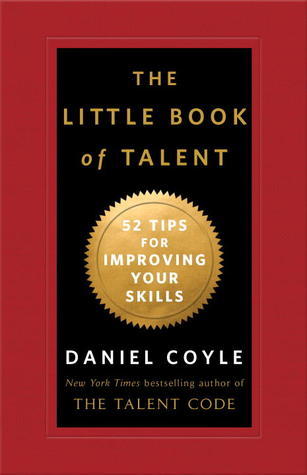Title: The Little Book of Talent: 52 Tips for Improving Your Skills
Author: Daniel Coyle
First published January 1, 2012
160 pages, Hardcover
ISBN: 9780345530257 (ISBN10: 034553025X)
Rating: 4.01
Overview
Looking to improve your skills and become a better version of yourself? Look no further than The Little Book of Talent by Daniel Coyle.
This handbook offers 52 scientifically proven, field-tested methods to enhance your skills in sports, music, art, math, and business. With insights gathered from five years of research and interviews with the world’s most successful coaches, this guidebook breaks down the complex process of skill development into easy-to-follow steps.
Whether you’re a beginner or a seasoned pro, young or old, this book is an essential tool for anyone seeking to improve their talents. As Charles Duhigg, bestselling author of The Power of Habit, says, “The Little Book of Talent should be given to every graduate at commencement, every new parent in a delivery room, every executive on the first day of work.” Don’t miss out on this life-changing read.
About the Author
Meet Daniel Coyle, an accomplished author whose latest book, The Culture Code, is set to release in January 2018. Coyle has a track record of New York Times bestsellers, including The Talent Code, The Little Book of Talent, and The Secret Race (co-authored with Tyler Hamilton).
He and Hamilton won the 2012 William Hill Sports Book of the Year Prize for their work. In addition to his writing, Coyle is a contributing editor for Outside magazine and serves as a special advisor to the Cleveland Indians.
When he’s not working, Coyle spends his summers in Homer, Alaska with his wife Jen and their four children, and lives in Cleveland, Ohio during the school year.
Editoral Review
The Little Book of Talent: 52 Tips for Improving Your Skills, by Daniel Coyle, is a must-read for anyone looking to improve their skills or talents. Coyle is a New York Times bestselling author and award-winning journalist who has written extensively on the topics of performance and mastery.
In this book, he distills his research and insights into 52 practical tips that readers can use to develop their talents, whether in sports, music, art, or any other field.
The book is written in a concise and accessible style, with each tip presented in a short chapter that can be read in just a few minutes. Coyle draws on examples from a wide range of disciplines, from the world of sports to the arts, to illustrate his points.
He also incorporates insights from experts in each field, providing readers with a rich and diverse set of perspectives.
The main theme of the book is that talent is not something that is innate, but rather something that can be developed through deliberate practice and focused effort. Coyle emphasizes the importance of breaking down skills into smaller components and practicing each component until it becomes automatic.
He also stresses the importance of feedback, both from coaches and from oneself, in order to identify areas for improvement.
One of the strengths of The Little Book of Talent is its practicality. Each tip is accompanied by specific exercises and drills that readers can use to apply the tip to their own practice.
For example, Tip 2, “Steal Without Apology,” encourages readers to study the techniques of successful performers in their field and to incorporate those techniques into their own practice. Coyle provides specific examples of how this can be done, such as by studying the footwork of a successful tennis player or the phrasing of a great musician.
Another strength of the book is its focus on the mindset of successful performers. Coyle emphasizes the importance of cultivating a growth mindset, in which failures and setbacks are seen as opportunities for learning and improvement.
He also stresses the importance of perseverance and grit, characteristics that are essential for achieving mastery in any field.
One potential weakness of the book is that some of the tips may seem obvious or simplistic to readers who are already well-versed in the principles of deliberate practice. However, even for experienced practitioners, the book provides valuable reminders and insights that can help to reinvigorate their practice.
Overall, The Little Book of Talent is a valuable resource for anyone looking to improve their skills or talents. It is well-written, practical, and grounded in research and real-world examples.
Whether you are a musician, athlete, artist, or simply someone looking to improve your performance in any area of life, this book is well worth your time.
Rating: 4.5/5. The book is well-written, practical, and grounded in research and real-world examples.
The only potential weakness is that some of the tips may seem simplistic to experienced practitioners.



